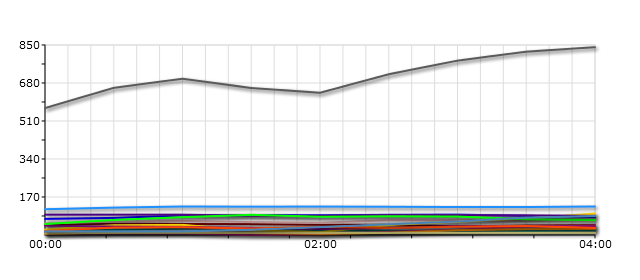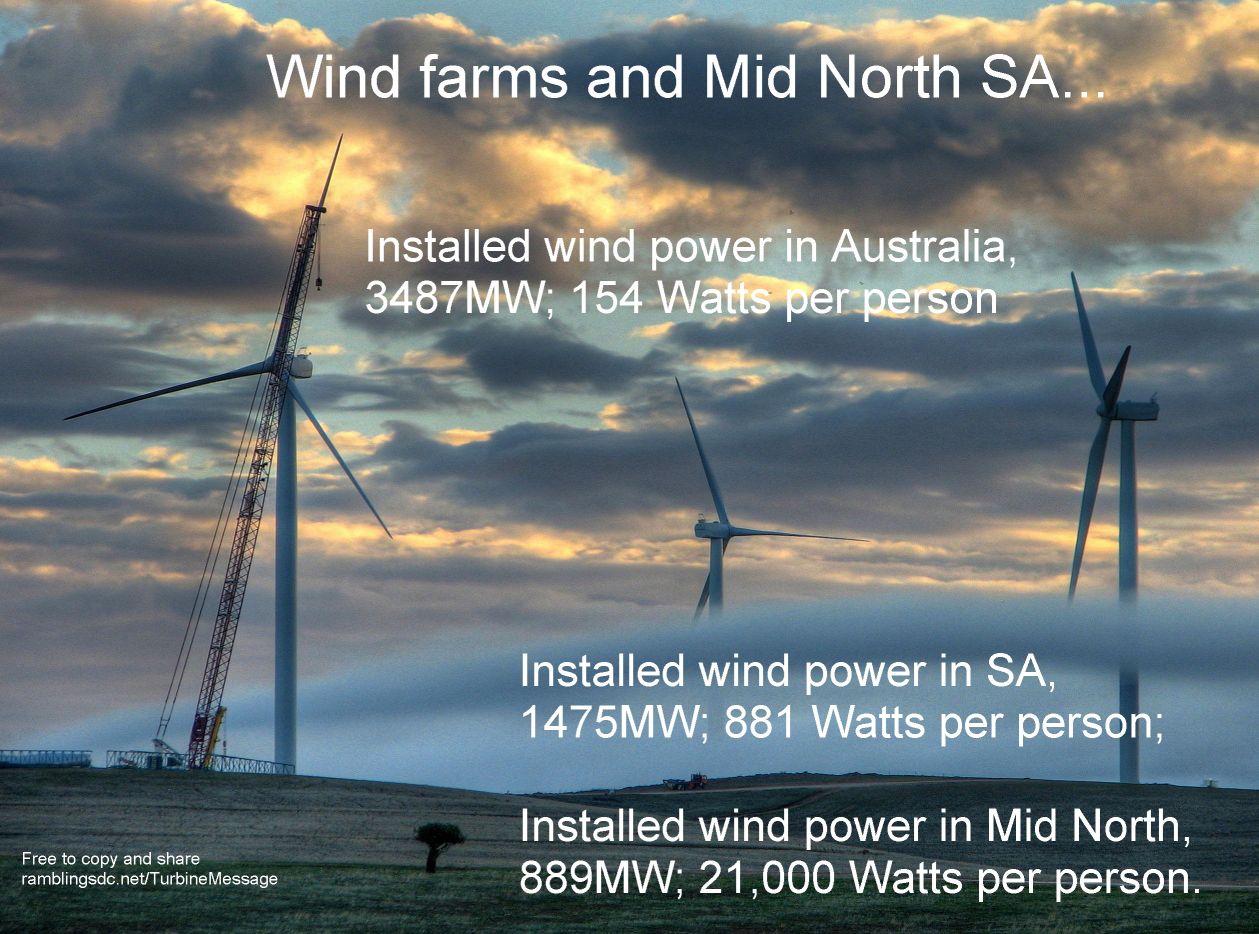| |||||
|
Rowan Ramsey gave a speech in the Australian Parliament in mid-February 2012 which was biased against wind power. In this speech he made a number of claims and inferences that were questionable at best and false at worst.
Mr Ramsey claims that he is very concerned with the high level of wind power in SA destabilising the grid. In a world that desperately needs to move away from fossil fuels and in an electorate that is leading the country in the development of renewable energy, Mr Ramsey, a Federal opposition back-bencher is so concerned about the stability of the state power grid – when there is no evidence of instability in that grid – that he makes a speech about it in Parliament! (I live in the same region as Mr Ramsey's electorate and as far as I can tell the power grid is quite stable.) He should be intensely proud of the adoption of renewable energy in his electorate. He should be welcoming the economic development that it has brought with it.
In his speech he implied that wind farms caused ill-health. There is no scientifically acceptable evidence that wind turbines cause sickness.
He questioned the sustainability of the wind farms in Grey. The implication here is that he holds that the fossil-fuelled power stations in Grey are more sustainable than are the sustainable energy installations! What sort of Orwellian double think is this? There is no evidence at all that wind power is unsustainable, if it was we would see abandonment of wind power somewhere in the world; we are not seeing this in any country. I believe that wind energy is the fastest growing form of electricity generation world-wide; certainly it is the fastest growing form of sustainable energy.
|
The graph on the right shows the generation from wind power in South Australia on the first four hours of 25th February 2012, the day before I wrote this. Quite obviously the electricity being supplied by the wind farms varies only slowly; where is the unreliability in this sort of power production?
On the other hand Mr Ramsey talked of coal or gas as 100% reliable sources of power. He might be surprised to learn that their availability, due to shut downs for maintenance or breakdown, is actually around 85%.
Mr Ramsey implied that wind power produces power spikes, without any evidence in support of his claim. In fact there are strict operating requirements that any generator must meet in order to avoid unacceptable voltage rises and I believe that in SA there are particularly stringent requirements that only apply to wind farms. Also, do you see evidence of power spikes in the graph?
|
|
|
Mr Ramsey talked about destabilisation of the grid due to wind power, but did not give any evidence that there had been any. More that 20% of SA's power comes from wind farms and so far as I can tell, the power grid is as stable and reliable as it ever has been; the Australian Energy Market Operator (AEMO) and Electranet seem to have no complaints. SA's power supply is linked to the eastern states and the whole system is controlled by AEMO. The total installed wind generation capacity in this grid is 3.9%. For comparison, the grid controlled by 50 Hertz Transmission GmbH in Germany has 30.6% installed wind power and the Energinet grid in Denmark has 28.6%.
Mr Ramsey was correct in stating that not all of the wind power projects proposed in SA could be built without major changes to the electricity supply infrastructure and especially far more interconnection to the eastern states. He would know that for every wind farm built in Australia about five have been proposed; no one expects all the proposed wind farms to be built.
Mr Ramsey talked about the Ceres Project proposed for Yorke Peninsula and said that the announcement of this was very good. He then went on and linked it with forcing the closing down of "the coal fired power stations at Port Augusta and probably much of the capacity of the gas generation at Torrens Island". It would be wonderful if the Thomas Playford coal-fired power station at Port Augusta could be closed down – it is the dirtiest in Australia in terms of carbon dioxide emitted relative to power generated. Does Mr Ramsey see the closing down of the dirtiest power station in Australia as a bad thing?
Mr Ramsey implied that gas-fired power stations would necessarily be closed down if the wind power industry was to expand much further. This is a very questionable link to make; the gas-fired power stations will be required for the periods when the wind is not blowing. Why would they be closed down while they are needed?
Finally Mr Ramsey urged "the South Australian government and the promoters of these wind farms to be honest with the electorate". I would urge the same of Rowan Ramsey!
I have no doubt that the rise of renewable energy, wind power in particular, is causing problems to the fossil fuel fired power stations. The companies who run the latter do not like having to cut their generation (and profits) to make room on the grid for wind power. It is these same power stations that are among the biggest greenhouse gas polluters in Australia.
Is Mr Ramsey looking after the interests of his constituents, or of the fossil fuel industry? He is correct, as I understand it, in pointing out that there are times when the generated wind power loads the SA grid to its limit, and that there will be a need for more interconnection between SA and the eastern states if wind power is to expand much further. But most power grids around the world are operating at or near their limits some of the time; it is uneconomical to build power grids with large amounts of reserve capacity.
The Liberal Party's systematic
attacks on sustainable energy and support for
the fossil fuel industry in its campaign to stop the rise in sustainable
energy shows a complete abandonment of
ethical standards.
An open letter to Rowan Ramsey, October 2018
|
Dear Rowan;
Back in 2012 you gave a speech in the Australian Parliament in which you made a number of very questionable, even false, claims against wind power. I will not list them here, you may recall that I published them at the time in this Web page.
I'm sure that you are aware that, at the time of writing, something like 80 percent of South Australia's wind power, and 40 percent of Australia's wind power, are in your electoral division of Grey. Plainly they have been a major financial development and are an important employer in your electorate; the wind turbines in your electorate generate a large part of South Australia's electricity.
You would also know, in spite of all the misinformation to the contrary, that South Australia's adoption of a high percentage of renewable energy has been a great success, as I've written at SA's success with renewable energy. The new Liberal Marshall SA government has recognised this success and will continue the previous Labor SA government's support for renewable energy development.
Progressive people like Sanjeev Gupta, who you would certainly be well aware of, know that renewables are the way of the future and that the coal industry is on the way out.
Considering the above and the recent Intergovernmental Panel on Climate Change report I would be very interested to know whether you now have anything good to say about wind power in particular and renewable power in general. Do you see the change from fossil fuels to renewables as being urgent?
Yours faithfully, David Clarke.
I received no further response from Mr Ramsey.
An open letter to Rowan Ramsey, December 2019
Australia's commitment to the Paris Climate Agreement is pathetic, so whether or not we comply is almost irrelevant. Australia's per-capita rate of greenhouse emissions are among the highest in the world, so we have a moral obligation to the people of the world, especially to those who are now young, to substantially and urgently reduce our emissions. In any case reducing our emissions is in Australia's best interests.As you well know, there have recently been unprecedented fires in both NSW and SA, Australia has experienced its hottest day on record, there is an unprecedented drought and unprecedented low flows in the Murray-Darling. The world's climate scientists have warned us for years that this sort of thing was to be expected with climate change. It has also been reported that agricultural incomes in Australia had fallen 22% due to climate change.
Australia ranks 53rd in the world in population, but sixth in the world in the carbon dioxide produced by its electricity industry. Australia has 0.3% of the world's population, but produces 1.2% of the world's greenhouse gasses. If Australia's fossil fuel exports are taken into consideration the nation is responsible for at least 3.6% of the world's greenhouse gas emissions.
The Climate Change Performance Index for 2020 ranked Australia last of all 58 countries rated for climate policy. It was the only nation to receive a score of zero out of 100, the second lowest scoring nation, the USA, received a score of 2.8.
Our international reputation is in the mud. The people of Australia can only be ashamed of our country's record.
I've written more on this subject on another page on this site.
Australia has sustainable energy resources as good or better than any other country, our future is in renewable energy (as is the world's future), but our government's obsession with coal is holding our nation back.
I hope that you are doing all you can to press the government for action on emissions reduction and the fastest possible change from fossil fuels to renewable energy.
I received no further response from Mr Ramsey.

